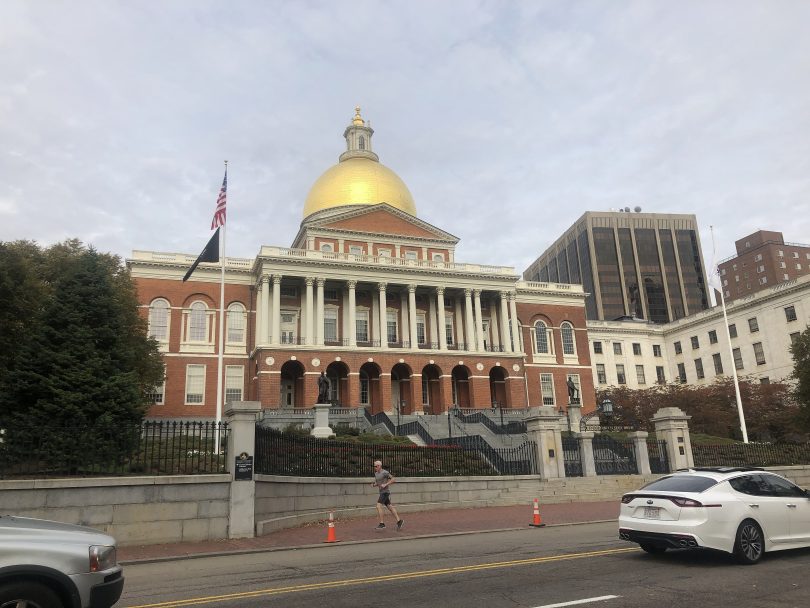By Lauryn Allen
BU News Service
The simple question behind the $32.4 million advertising campaign peppering the airwaves and social media on Question 1 is whether car manufacturers must share telematics – mechanical data transmitted wirelessly by a vehicle – with vehicle owners and independent repair shops.
The original Right to Repair law – approved by Massachusetts voters by an 86-14 percent vote in 2012 – was the first of its kind in the country, but opponents say the debate this year is about far more than data transparency.
A “yes” vote on Question 1 would update existing law to provide vehicle owners and independent repair facilities access to telematics data used for diagnosis, maintenance and repair previously excluded. Backers include car parts suppliers and independent repair shops.
A “no” vote would keep the state’s current law unchanged and require independent repair shops to physically retrieve diagnostic information from a vehicle’s On-Board Diagnostics port. Opponents of the change are largely financed by car manufacturers, according to Massachusetts Office of Campaign and Political Finance data.
Independent repair shops will be put at a significant disadvantage compared to car manufacturers and dealerships as more vehicles become equipped with these wireless systems, said Tommy Hickey, the director of the Massachusetts Right to Repair Coalition.
“Without closing the loophole, independent repair shops won’t be able to fix these new cars because they won’t have all the information necessary,” Hickey wrote in an email, stressing that access to telematics data is imperative for independent shops to remain competitive with the major dealers who already have access to this data. He warned a no vote could force consumers to car dealerships for more expensive repairs.
“Independent repair shops must be able to evolve with the vehicle,” Hickey wrote. “In a competitive market, you need up to date technology to thrive.”
Other Question 1 backers echoed this worry, adding that lack of access to wireless data will take away a vehicle owner’s options by steering them away from independent shops that may not have all the information necessary to diagnose and repair their vehicle.
Michael Woodward, owner of Ernie’s Garage in Northampton, wrote in an email that while updating R2R will not make a noticeable difference in the way most independent shops operate now, vehicle owners will have no choice but to go to dealerships for repairs as telematics becomes the standard.
“This ballot question does not impact us today,” Woodward wrote. “But it will have an extremely negative impact on us in the near future. If this question doesn’t get a yes vote now, by 2031, nearly all vehicles will have to go to a dealer for emissions repairs. By 2036, all cars will have to go to the dealer for anything but routine maintenance.”
The main opposition to Question 1, the Coalition for Safe and Secure Data, argued that mechanics already have access to the data necessary for car repairs and that this amended legislation poses serious privacy and personal safety concerns.
“This misleading and ill-conceived proposal would do nothing to improve the consumer experience while creating dangerous new data privacy and cybersecurity concerns,” according to the coalition’s website.
The coalition ran several television ads paid for by donations from major car manufacturers, including Toyota, Honda and Ford, claiming that if passed, Question 1 will allow hackers and criminals remote access to vehicles operating on the road as well as an owner’s driving data.
The coalition has also won support of a federal highway safety organization.
In a July letter to the Legislature’s Committee on Consumer Protection and Professional Licensure, James C. Owens, deputy administrator of the National Highway Traffic Safety Administration, acknowledged the importance of third parties having access to data necessary for repairs and diagnostics, but urged legislators to consider the cybersecurity risks of the initiative in its current state.
“A cyberattack on one or more motor vehicles has enormous potential safety consequences – a 4,000 to 80,000 lbs. vehicle operating at highway speeds can pose an incredible amount of danger to its surroundings if manipulated,” Owens wrote.
In its argument in the Massachusetts Information for Voters packet, the coalition also cited possible risks to domestic violence victims if the initiative passes, including the possibility of abusers getting access to personal data such as GPS location and call information.
But Jane Doe, Inc., the Massachusetts Coalition Against Sexual Assault and Domestic Violence organization cited by opponents, wrote that it was not consulted about appearing in the voter guide and that it is not taking a public stand on the ballot question.
“The ballot question proposed … does not appear to pose the heightened risk of breach of personal information as suggested by those who oppose this initiative,” the coalition wrote. “We do not believe that a yes vote on 1 would uniquely compromise survivor safety in the manner portrayed by opponents.”
According to a report released by the Tufts Center for State Policy Analysis, the data privacy concerns raised by opponents of the updated legislation will not hold much weight provided that location data and personal information remain omitted from the law.
“So long as GPS and other privacy-related information are excluded – as it seems to be – concerns about data misuse are greatly diminished,” according to the report.
The report recommended the Legislature take steps to “eliminate any ambiguity by specifying that only repair-relevant telematics data – and not GPS or other sensitive data – will be made available to independent repair shops” if the legislation passes.
This article was originally published in the Daily Hampshire Gazette.






[…] Question 1: Amending the state’s Right to Repair law – BU News Service […]
[…] asked, the ballot questions had more varied results. A yes on the first question — Right to Repair — would allow local repair shops access to vehicle data with user permission. A yes on the second […]